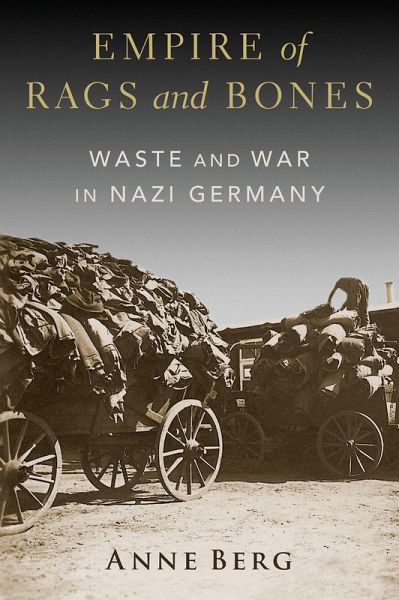
Empire of Rags and Bones (eBook, ePUB)
Waste and War in Nazi Germany
Versandkostenfrei!
Sofort per Download lieferbar
20,95 €
inkl. MwSt.
Weitere Ausgaben:

PAYBACK Punkte
10 °P sammeln!
Paper, bottles, metal scrap, kitchen garbage, rubber, hair, fat, rags, and bones--the Nazi empire demanded its population obsessively collect anything that could be reused or recycled. Entrepreneurs, policy makers, and ordinary citizens conjured up countless schemes to squeeze value from waste or invent new purposes for defunct or spent material, no matter the cost to people or the environment. As World War II dragged on, rescued loot--much of it waste--clogged transport routes and piled up in warehouses across Europe. Historicizing the much-championed ideal of zero waste, Anne Berg shows that...
Paper, bottles, metal scrap, kitchen garbage, rubber, hair, fat, rags, and bones--the Nazi empire demanded its population obsessively collect anything that could be reused or recycled. Entrepreneurs, policy makers, and ordinary citizens conjured up countless schemes to squeeze value from waste or invent new purposes for defunct or spent material, no matter the cost to people or the environment. As World War II dragged on, rescued loot--much of it waste--clogged transport routes and piled up in warehouses across Europe. Historicizing the much-championed ideal of zero waste, Anne Berg shows that the management of waste was central to the politics of war and to the genesis of genocide in the Nazi Germany. Destruction and recycling were part of an overarching strategy to redress raw material shortages, procure lebensraum, and cleanse the continent of Jews and others considered undesirable. Fostering cooperation between the administration, the party, the German Army, the SS, and industry, resource extending schemes obscured the crucial political role played by virtually all German citizens to whom salvaging, scrapping, and recycling were promoted as inherently virtuous and orderly behaviors. Throughout Nazi occupied-Europe, Jews, POWs, concentration camp inmates, and enemy civilians were forced to recycle the loot, discards, and debris of the Nazi race war. In the end, the materials that were fully exploited and the people who had been bled dry were cast aside, buried, burned, or left to rot. Nonetheless, waste reclamation did not have the power to win the war. Illuminating how the Nazis inverted the economy of value, rescuing discards and murdering people, Empire of Rags and Bones offers an original perspective on genocide, racial ideology, and World War II.
Dieser Download kann aus rechtlichen Gründen nur mit Rechnungsadresse in A, B, BG, CY, CZ, D, DK, EW, E, FIN, F, GR, HR, H, IRL, I, LT, L, LR, M, NL, PL, P, R, S, SLO, SK ausgeliefert werden.













